Strictly Personal
2024 is our 1994 – The reawakening of justice and freedom for South Africa, By Tebogo Moalusi
Published
10 months agoon

I was born in July 1984, on a cold winters’ morning, at Chris Hani Baragwanath Hospital, located in Soweto. The hospital is the largest hospital in Africa and the third largest hospital in the world. At the time, it was ranked as one of the best hospitals globally, providing quality and dignified healthcare for South Africans.
It was also an incredible developmental workspace for healthcare professionals globally. Like drinking safe water from the tap without worry, it not only provided a basic need, but it was also a jewel in the proverbial South African crown, which left us gleaming with pride and a sense of achievement.
Growing up in Pimville Zone 7 and Mofolo Central as a child was relatively great. I grew up knowing deep love, community, safety, and family. There was a great sense of unity which was fuelled by compassion and a true sense of Ubuntu. Every child was the community’s responsibility, and all older people were respected as leaders, guiding us to be and do better. The meeting place was the street, where children from different families joined in play, storytelling, adventure and sports from early morning until night-time. I hardly ever thought about being kidnapped or being harmed by criminals. And if anything was to ever happen, the community would rise together to ensure justice prevailed, swiftly.
1994 was a turning point
We did not have much, but never felt like we lacked. We were all generally materially poor, doing the best we could with what we had. But our hearts and minds were full. As kids, our imagination and kasi innovation borrowed from what we saw on TV, kept us busy and generally happy. It was only later in life that I discovered that my parents bore the brunt of protecting us against the pain, injustice, and violence of the apartheid state. For that, I am eternally grateful.
In 1994, I was 10 years old, living in Fourways with my family. Interestingly, while seeking a better life, leaving Soweto to live in the suburbs disconnected me and us from that sense of community inherent in township life. The life and rituals of playing in the street with friends were no longer available. Here we were all, strangers getting on with life. It is here that I first experienced prejudice, racism and being psychologically unsafe. It is here that I felt lesser than, naked, poor and an outsider.
On 27 April 1994, I remember my parents waking up early and going to the nearby school to cast their vote. It was a day filled with happiness, euphoria and determination. I remember my father referring to the fact that he had to vote to pay tribute to Chris Hani, who was brutally assassinated only a year before, a moment that almost catapulted South Africa into civil war. For Papa, to vote was a duty to country, a commitment to the liberation struggle and a prayer for his children. It was a vote for change and hope.
For me, 1994 resembled a turning point, wherein we could shift from pain to prosperity. While not of voting age, I was now alive to what injustice felt like, experiencing micro and even overt racism in the community we resided. From an early age, it was not difficult to see that pain was disproportionately experienced by certain people more than others, and I belonged to that group. As kids, we also snuck in the chance to watch movies like Sarafina and Bopha, which made us alive to the atrocities of apartheid, giving us a language and framework for understanding the struggle for freedom, peace, justice and equality. As I grew up and became more conscious, I was drawn to the idea of being a champion against injustice and black pain and indignity.
Over the years, I have had the opportunity to attend excellent schools, universities and work in leading companies at the highest levels. I have cut my teeth at starting and running my own successful and failed businesses.
In the different phases of my life, leadership was a vocation, a calling. And so, I made it my responsibility to serve my vocation and gift with excellence. But the purpose and undercurrent of all the leadership work was about justice. For me, justice is both a process and a destination. We must operate in a just manner to achieve the South Africa we deserve, and we must fight for a just society.
SA is in decline
The 1994 promise and moment was many things, but justice remains at the center because it is justice that serve victims, survivors and the underprivileged. Justice serves freedom and equality. Justice is humanness.
Having been borne from a family that served the liberation struggle, serving the people was at the core of how I define contribution and significance. But service and leadership come with tremendous responsibility. One of those is self-awareness and consciousness. You cannot lead others if you do not know yourself, in the context of your environment. Working with people and transforming opportunity to value generated power and influence. Therefore, my journey has been about understanding the power and influence I have accrued through personal and collective sacrifice and using it to serve the people.
For the last decade, I have been seeing and experiencing a South Africa that is in gross and accelerated decline. The gems in the crown have been lost and stolen.
Like most state institutions, our beloved Chris Hani Baragwanath Hospital is a ghost of its former self yet carrying the name of one of the most iconic leaders of our lifetime. Recently, the cholera death toll in South Africa has risen to 32 due to lack of access to quality drinking water. The quality of education is poor, while we live in the most unequal and violent country in the world. Joblessness, electricity blackouts, drug and substance abuse, mental illness, suicide, gender-based violence, and many other social ills are at an all-time high.
Dwindling voter turnout
Voter turnout and engagement are dwindling as people lose faith in democracy and the Constitution people fought and died for. People are hungry, angry, hopeless and disillusioned. All this, under a democratically elected ANC government. A better life for all is an illusion that cannot be achieved under this ANC administration. We are in a crisis.
In early 2022, I coined the phrase, “2024 is our 1994″. It was the converging moment when I realised that enough was enough, and that there was no one coming to save us. We had given the governing party so many chances to advance the promises of 1994, and what we are inheriting is a dysfunctional country run by corrupt politicians who have sold out on the vision of our ancestors and liberation leaders.
In this statement, I wanted to agitate for urgent change, knowing that the window to avert complete disaster closes with each day of uncoordinated inaction. As part of my journey of a commitment to justice and leadership, something had to be done. At the time, I had no political home, and it did not matter. What mattered was speaking truth to power and exciting others to do the same. When my path collided with RISE Mzansi last year, it was clear that this is where such an idea could find a home and germinate into a tree that will be the shade that covers generations to come.
“To whom much is given, much will be required” (Luke 12:48). For me the journey ahead is about justice. Justice is about the leveraging our collective power to equalise the Balance of Privileged.
Privilege is “a special right, advantage, or immunity granted or available only to a particular person or group”. This privilege means that based on their race, ethnicity, gender, sex, sexual orientation, dis/ability, religion, age, class, nationality, physical appearance, accent, vocal pitch, language proficiency, degree of introversion or extroversion, cultural customs, educational background, or upbringing, the system often says “YES” to you.
You may like
-


This Sudan war is too senseless; time we ended it, By Tee Ngugi
-


S’Africa lengthens troop deployment in Mozambique, Congo DR
-
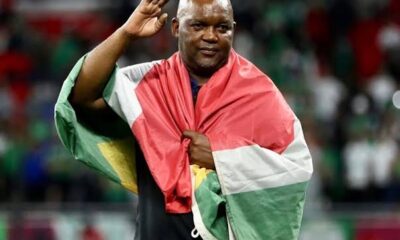

Domestic worker sues Pitso Mosimane, wife following debilitating injuries
-
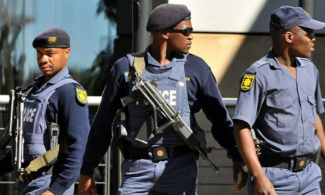

South African police arrest 8 Nigerians following attacks on officers
-


SA internet service provider Kaya Konekta launches data access for underserved communities
-


IMF says South Africa needs to do more to cut spending, lower debt-to-GDP ratio
Strictly Personal
This Sudan war is too senseless; time we ended it, By Tee Ngugi
Published
2 days agoon
April 28, 2024
Why are the Sudanese Armed Forces (SAF) and the paramilitary Rapid Support Forces (RPF) engaged in a vicious struggle? It is not that they have ideological, religious or cultural differences.
Not that people should fight because of these kinds of differences, but we live in a world where social constructions often lead to war and genocide. It is not that either side is fighting to protect democracy. Both sides were instruments of the rapacious dictatorship of Omar el-Bashir, who was overthrown in 2019.
Both are linked to the massacres in Darfur during Bashir’s rule that led to his indictment by the International Criminal Court for crimes against humanity. They both stood by as ordinary, unarmed people took to the streets and forced the removal of the Bashir regime.
None of these entities now fighting to the last Sudanese citizen has any moral authority or constitutional legitimacy to claim power. They both should have been disbanded or fundamentally reformed after the ouster of Bashir.
The SAF and the RSF are fighting to take over power and resources and continue the repression and plunder of the regime they had supported for so long. And, as you can see from news broadcasts, they are both well-versed in violence and plunder.
Since the fighting began in 2023, both sides have been accused of massacres that have left more than 30,000 people dead. Their fighting has displaced close to 10 million people. Their scramble for power has created Sudan’s worst hunger crisis in decades. Millions of refugees have fled into Chad, Ethiopia and South Sudan.
The three countries are dubious places of refuge. Chad is a poor country because of misrule. It also experiences jihadist violence. Ethiopia is still simmering with tensions after a deadly inter-ethnic war.
And South Sudan has never recovered from a deadly ethnic competition for power and resources. African refugees fleeing to countries from which refugees recently fled or continue to flee sums up Africa’s unending crisis of governance.
Africa will continue to suffer these kinds of power struggles, state failure and breakdown of constitutional order until we take strengthening and depersonalising our institutions as a life and death issue. These institutions anchor constitutional order and democratic process.
Strong independent institutions would ensure the continuity of the constitutional order after the president leaves office. As it is, presidents systematically weaken institutions by putting sycophants and incompetent morons in charge. Thus when he leaves office by way of death, ouster or retirement, there is institutional collapse leading to chaos, power struggles and violence. The African Union pretends crises such as the one in Sudan are unfortunate abnormally. However, they are systemic and predictable. Corrupt dictatorships end in chaos and violence.
Tee Ngugi is a Nairobi-based political commentator.
Strictly Personal
Air Peace, capitalism and national interest, By Dakuku Peterside
Published
2 weeks agoon
April 16, 2024
Nigerian corporate influence and that of the West continue to collide. The rationale is straightforward: whereas corporate activity in Europe and America is part of their larger local and foreign policy engagement, privately owned enterprises in Nigeria or commercial interests are not part of Nigeria’s foreign policy ecosystem, neither is there a strong culture of government support for privately owned enterprises’ expansion locally and internationally.
The relationship between Nigerian businesses and foreign policy is important to the national interest. When backing domestic Nigerian companies to compete on a worldwide scale, the government should see it as a lever to drive foreign policy, and national strategic interest, promote trade, enhance national security considerations, and minimize distortion in the domestic market as the foreign airlines were doing, boost GDP, create employment opportunities, and optimize corporate returns for the firms.
Admitted nations do not always interfere directly in their companies’ business and commercial dealings, and there are always exceptions. I can cite two areas of exception: military sales by companies because of their strategic implications and are, therefore, part of foreign and diplomatic policy and processes. The second is where the products or routes of a company have implications for foreign policy. Air Peace falls into the second category in the Lagos – London route.
Two events demonstrate an emerging trend that, if not checked, will disincentivize Nigerian firms from competing in the global marketplace. There are other notable examples, but I am using these two examples because they are very recent and ongoing, and they are typological representations of the need for Nigerian government backing and support for local companies that are playing in a very competitive international market dominated by big foreign companies whose governments are using all forms of foreign policies and diplomacy to support and sustain.
The first is Air Peace. It is the only Nigerian-owned aviation company playing globally and checkmating the dominance of foreign airlines. The most recent advance is the commencement of flights on the Lagos – London route. In Nigeria, foreign airlines are well-established and accustomed to a lack of rivalry, yet a free-market economy depends on the existence of competition. Nigeria has significantly larger airline profits per passenger than other comparable African nations. Insufficient competition has resulted in high ticket costs and poor service quality. It is precisely this jinx that Air Peace is attempting to break.
On March 30, 2024, Air Peace reciprocated the lopsided Bilateral Air Service Agreement, BASA, between Nigeria and the United Kingdom when the local airline began direct flight operations from Lagos to Gatwick Airport in London. This elicited several reactions from foreign airlines backed by their various sovereigns because of their strategic interest. A critical response is the commencement of a price war. Before the Air Peace entry, the price of international flight tickets on the Lagos-London route had soared to as much as N3.5 million for the economy ticket. However, after Air Peace introduced a return economy class ticket priced at N1.2 million, foreign carriers like British Airways, Virgin Atlantic, and Qatar Airways reduced their fares significantly to remain competitive.
In a price war, there is little the government can do. In an open-market competitive situation such as this, our government must not act in a manner that suggests it is antagonistic to foreign players and competitors. There must be an appearance of a level playing field. However, government owes Air Peace protection against foreign competitors backed by their home governments. This is in the overall interest of the Nigerian consumer of goods and services. Competition history in the airspace works where the Consumer Protection Authority in the host country is active. This is almost absent in Nigeria and it is a reason why foreign airlines have been arbitrary in pricing their tickets. Nigerian consumers are often at the mercy of these foreign firms who lack any vista of patriotism and are more inclined to protect the national interest of their governments and countries.
It would not be too much to expect Nigerian companies playing globally to benefit from the protection of the Nigerian government to limit influence peddling by foreign-owned companies. The success of Air Peace should enable a more competitive and sustainable market, allowing domestic players to grow their network and propel Nigeria to the forefront of international aviation.
The second is Proforce, a Nigerian-owned military hardware manufacturing firm active in Rwanda, Chad, Mali, Ghana, Niger, Burkina Faso, and South Sudan. Despite the growing capacity of Proforce in military hardware manufacturing, Nigeria entered two lopsided arrangements with two UAE firms to supply military equipment worth billions of dollars , respectively. Both deals are backed by the UAE government but executed by UAE firms.
These deals on a more extensive web are not unconnected with UAE’s national strategic interest. In pursuit of its strategic national interest, India is pushing Indian firms to supply military equipment to Nigeria. The Nigerian defence equipment market has seen weaker indigenous competitors driven out due to the combination of local manufacturers’ lack of competitive capacity and government patronage of Asian, European, and US firms in the defence equipment manufacturing sector. This is a misnomer and needs to be corrected.
Not only should our government be the primary customer of this firm if its products meet international standards, but it should also support and protect it from the harsh competitive realities of a challenging but strategic market directly linked to our national military procurement ecosystem. The ability to produce military hardware locally is significant to our defence strategy.
This firm and similar companies playing in this strategic defence area must be considered strategic and have a considerable place in Nigeria’s foreign policy calculations. Protecting Nigeria’s interests is the primary reason for our engagement in global diplomacy. The government must deliberately balance national interest with capacity and competence in military hardware purchases. It will not be too much to ask these foreign firms to partner with local companies so we can embed the technology transfer advantages.
Our government must create an environment that enables our local companies to compete globally and ply their trades in various countries. It should be part of the government’s overall economic, strategic growth agenda to identify areas or sectors in which Nigerian companies have a competitive advantage, especially in the sub-region and across Africa and support the companies in these sectors to advance and grow to dominate in the African region with a view to competing globally. Government support in the form of incentives such as competitive grants ,tax credit for consumers ,low-interest capital, patronage, G2G business, operational support, and diplomatic lobbying, amongst others, will alter the competitive landscape. Governments and key government agencies in the west retain the services of lobbying firms in pursuit of its strategic interest.
Nigerian firms’ competitiveness on a global scale can only be enhanced by the support of the Nigerian government. Foreign policy interests should be a key driver of Nigerian trade agreements. How does the Nigerian government support private companies to grow and compete globally? Is it intentionally mapping out growth areas and creating opportunities for Nigerian firms to maximize their potential? Is the government at the domestic level removing bottlenecks and impediments to private company growth, allowing a level playing field for these companies to compete with international companies?
Why is the government patronising foreign firms against local firms if their products are of similar value? Why are Nigerian consumers left to the hands of international companies in some sectors without the government actively supporting the growth of local firms to compete in those sectors? These questions merit honest answers. Nigerian national interest must be the driving factor for our foreign policies, which must cover the private sector, just as is the case with most developed countries. The new global capitalism is not a product of accident or chance; the government has choreographed and shaped it by using foreign policies to support and protect local firms competing globally. Nigeria must learn to do the same to build a strong economy with more jobs.
EDITOR’S PICK
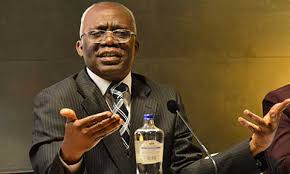

Nigeria: Human rights lawyer accuses govt of acting World Bank, IMF script on electricity tariffs hike
Nigerian human rights lawyer and advocate, Femi Falana, has accused the President Bola Tinubu government of acting out a script...


Wizkid, Davido’s online battle gets nasty as they exchange ‘dirty’ tweets
The online battle between two of Nigeria’s biggest music stars, Ayodeji Balogun, aka Wizkid, and David Adedeji, popularly known as...
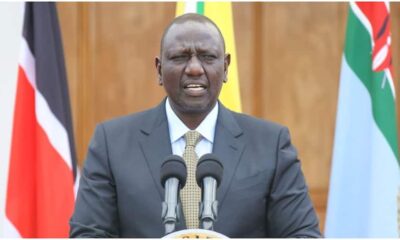

African leaders want record World Bank financing to address climate change
Ahead of a World Bank conference scheduled for later this year, African leaders on Monday called for rich countries to...
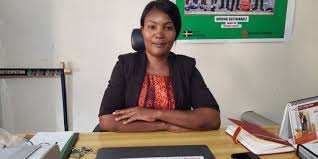

Conservationist, Kearns, names intolerance and digital media abuse as threats to media freedom
Nsama Kearns, the Executive Director of Care for Nature, speaks on the indispensable role of a free media in society....
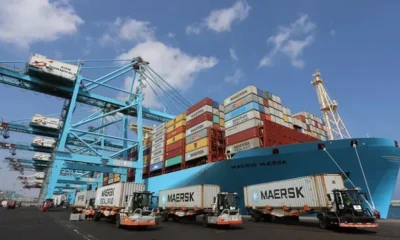

Nigeria gets $600 million investment from Danish firm Moller-Maersk
Nigeria’s presidency said on Sunday that President Bola Tinubu had secured an investment of $600 million from Danish shipping and...


Bolt Kenya teams up with M-KOPA to launch electric motorcycles
In a bid to improve driver earnings and combat climate change, ride-hailing platform, Bolt Kenya, has struck a partnership with...
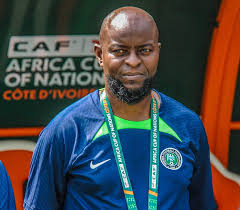

Nigeria’s football federation appoints Finidi George as Super Eagles coach
The Nigeria Football Federation (NFF) has approved the appointment of former international, Finidi George, as the new head coach of...
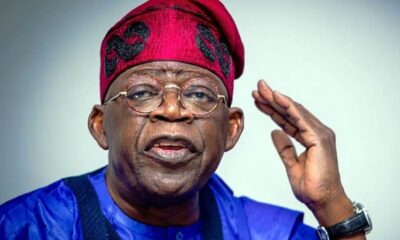

I saved Nigeria from bankruptcy by removing fuel subsidy— Tinubu
Nigerian President, Bola Tinubu, on Sunday, boasted that he saved Nigeria from going bankrupt by removing fuel subsidy on his...


Behind the News: All the backstories to our major news this week
Over the past week, there were lots of important stories from around the African continent, and we served you some...
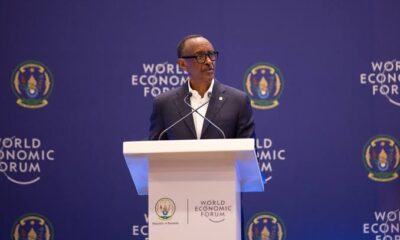

Video: How Rwanda is driving Ai revolution in Africa
In this video, the Managing Director of Rwanda’s Centre for the Fourth Industrial Revolution, Crystal Rugege, speaks on the country’s...
Trending
-

 Behind the News2 days ago
Behind the News2 days agoBehind the News: All the backstories to our major news this week
-
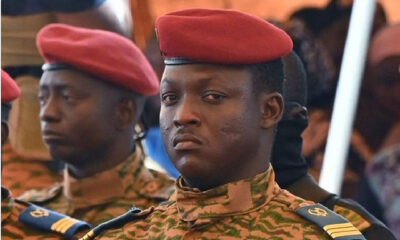
 Politics2 days ago
Politics2 days agoBurkina Faso investigating reports of northern killings
-
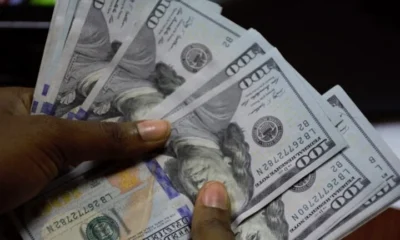
 VenturesNow2 days ago
VenturesNow2 days agoNigeria: Bureaux De Change operators to harmonise retail FX market
-

 Metro1 day ago
Metro1 day agoConservationist, Kearns, names intolerance and digital media abuse as threats to media freedom


